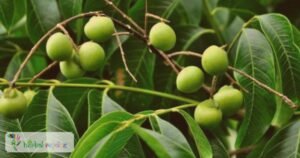Introduction
Aritha or Chinese Soap Berry, also known as Soap Nut tree of North India, is a fascinating plant that belongs to the Sapindaceae family. These fruits have been traditionally used to treat conditions such as excessive salivation, fungal infections, chlorosis, and epilepsy. One of the key actions attributed to the fruits of the Chinese Soap Berry is their emetic and expectorant properties.
Aritha – A Versatile Plant

Names And Habitat of Aritha
Native to China and Japan, it can also be found in the Himalayan region, specifically from Himachal Pradesh eastwards and in Assam. This plant has a long history of use in various traditional medicinal systems, notably Ayurveda.
In Ayurvedic medicine, Aritha/Chinese Soap Berry is known by the names Arishtaka and Phenila, while in folk medicine, it is referred to as Reethaa.
Chemical Constituents of Aritha
Modern scientific studies have identified triterpenoid glycosides called sapindosides in the plant. These sapindosides are derived from a compound called hederagenin.
Saponins, such as sapindosides, are known to have several pharmacological properties, including hypotensive, anticholesterolemic, spermicidal, and antimicrobial effects.
Research has shown that specific sapindosides, namely Saponin A and C, as well as sapindoside A and B, extracted from the fruit rind of Aritha/Chinese Soap Berry, exhibit antifungal activity. This finding suggests that these compounds could be potentially useful in the treatment of fungal infections.
Key Components Of Aritha
Apart from sapindosides, Aritha contains other beneficial compounds. Flavonoids, such as quercetin, kaempferol, apigenin, and rutin, have also been identified in the plant.
These flavonoids are known for their antioxidant properties and may contribute to the overall health-promoting effects of Chinese Soap Berry.
Furthermore, hederagenin, which can also be isolated from the fruit rind or pericarp, has been utilized in the development of skin-lightening and anti-inflammatory cosmetic products.
Aritha – A Gentle Cleanser
In recent years, Chinese Soap Berry has gained popularity as an eco-friendly alternative to chemical-based laundry detergents. The fruits of this plant contain a natural surfactant called saponin, which acts as a gentle cleanser.
When mixed with water, the saponin-rich extract forms a frothy solution that effectively removes dirt and stains from clothes.
This natural detergent is biodegradable and does not cause harm to the environment, making it a great choice for those looking for sustainable cleaning options.
Aritha – A Natural Pesticide
In addition to its laundry uses, Chinese Soap Berry has also been explored for its potential as a natural insecticide. Saponins found in the plant have been shown to have insecticidal properties, making them a promising alternative to synthetic pesticides.
This could be particularly beneficial in organic farming and gardening, where minimizing the use of harmful chemicals is a priority.
Aritha – A Natural Hair Care Ingredient
Furthermore, Aritha or Chinese Soap Berry has been evaluated for its potential as a natural hair care ingredient. The saponins in the fruit extract have been found to have a cleansing effect on the scalp and hair, making it a possible alternative to conventional shampoos.
Additionally, the plant’s high antioxidant content may help protect the hair from damage caused by free radicals.
Conclusion
In conclusion, Aritha is a versatile and beneficial plant with a rich history in traditional medicine. Its fruits possess emetic and expectorant properties and contain triterpenoid glycosides that have various pharmacological effects.
Furthermore, the plant’s saponins demonstrate antifungal, hypotensive, anticholesterolemic, spermicidal, and antimicrobial activity. Chinese Soap Berry also contains flavonoids, which contribute to its antioxidant properties.
With its natural surfactant properties, this plant is an eco-friendly alternative for laundry detergents, and its insecticidal properties make it a promising natural pesticide.
Additionally, Chinese Soap Berry may have potential applications in hair care due to its cleansing and antioxidant effects. Embracing the benefits of Chinese Soap Berry can lead to a greener and healthier lifestyle.
Frequently Asked Questions(FAQs)
What is Chinese Soap Berry?
Chinese Soap Berry is a plant belonging to the Sapindaceae family, native to China, Japan, and the Himalayan region.
What are the traditional medicinal uses of Chinese Soap Berry?
Chinese Soap Berry has been traditionally used to treat conditions such as excessive salivation, chlorosis, and epilepsy.
What are sapindosides?
Sapindosides are triterpenoid glycosides found in Chinese Soap Berry. They have various pharmacological properties, including antifungal, hypotensive, anticholesterolemic, spermicidal, and antimicrobial effects.
How can Chinese Soap Berry be used as an antifungal treatment?
Specific sapindosides extracted from the fruit rind of Chinese Soap Berry exhibit antifungal activity, making them potential agents for the treatment of fungal infections.
What is hederagenin?
Hederagenin is a compound derived from Chinese Soap Berry. It has been utilized in the development of skin-lightening and anti-inflammatory cosmetic products.
What other beneficial compounds are found in Chinese Soap Berry?
Chinese Soap Berry also contains flavonoids, such as quercetin, kaempferol, apigenin, and rutin, which contribute to its antioxidant properties.
How can Chinese Soap Berry be used as an eco-friendly laundry detergent?
The fruits of Chinese Soap Berry contain a natural surfactant called saponin, which can effectively remove dirt and stains from clothes when mixed with water. This natural detergent is biodegradable and environmentally friendly.
Is Chinese Soap Berry an effective alternative to synthetic pesticides?
Yes, the saponins found in Chinese Soap Berry have insecticidal properties, making them a promising alternative to synthetic pesticides, particularly in organic farming and gardening.
How can Chinese Soap Berry be used in hair care?
The saponins in Chinese Soap Berry extract have a cleansing effect on the scalp and hair, making it a potential alternative to conventional shampoos. Additionally, its high antioxidant content may help protect the hair from damage.
What are the potential applications of Chinese Soap Berry in cosmetics?
Chinese Soap Berry has been used in the development of skin-lightening and anti-inflammatory cosmetic products due to the presence of compounds like hederagenin and flavonoids.
What are the specific names of Chinese Soap Berry in Ayurvedic medicine and folk medicine?
Chinese Soap Berry is known as Arishtaka and Phenila in Ayurvedic medicine, and Reethaa in folk medicine.
Where can Chinese Soap Berry be found in India?
Chinese Soap Berry can be found in the Himalayan region, specifically from Himachal Pradesh eastwards and in Assam.
Are there any side effects associated with the use of Chinese Soap Berry?
There are no known significant side effects associated with the use of Chinese Soap Berry.
Can Chinese Soap Berry be consumed directly?
Consuming Chinese Soap Berry directly is not advised, as the fruits have emetic properties, which can cause vomiting.
Can Chinese Soap Berry be grown in home gardens?
Chinese Soap Berry can be grown in home gardens, provided the appropriate climate and growing conditions are met.
Is Chinese Soap Berry safe for the environment?
Chinese Soap Berry is safe for the environment as a biodegradable and natural alternative to chemical-based laundry detergents and pesticides.
Can Chinese Soap Berry be used on sensitive skin?
Chinese Soap Berry is generally considered safe for sensitive skin due to its mild and natural properties. However, it is recommended to perform a patch test before using it extensively.
Can Chinese Soap Berry be used to treat respiratory conditions?
Chinese Soap Berry has traditionally been used to treat respiratory conditions due to its expectorant properties.
Can Chinese Soap Berry be used during pregnancy?
It is recommended to consult a healthcare professional before using Chinese Soap Berry during pregnancy to ensure safety and suitability.
Can Chinese Soap Berry be used in pet care?
Chinese Soap Berry can potentially be used in some pet care products due to its natural cleansing properties. However, it is advisable to consult a veterinarian before using it on pets.





